MercoPress. South Atlantic News Agency
Tag: Merval
-
Friday, September 7th 2018 - 09:18 UTC
IMF wants to wrap up talks to financially support Argentina “as rapidly as possible”
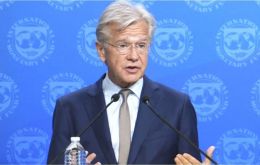
The International Monetary Fund said on Thursday it aimed to wrap up talks to “strengthen” a US$ 50 billion backup financing deal with Argentina “as rapidly as possible,” as the country's peso and stocks climbed for a second straight day.
-
Friday, August 10th 2018 - 06:51 UTC
Brazil and Argentina markets hit by domestic and overseas uncertainties
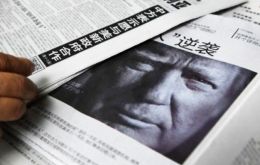
Major Latin American currencies fell against the dollar on Thursday as global trade tensions strengthened the greenback and political uncertainty in Brazil and Argentina. Latin America's largest economy heads into a presidential election in two months time and in Argentina a major corruption scandal is unfolding.
-
Tuesday, June 19th 2018 - 08:35 UTC
Argentina shores the Peso, stock market tumbles, ahead of 'Super Tuesday'
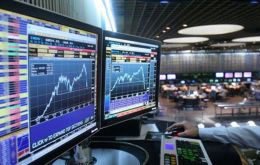
Argentina's peso rose sharply on Monday as a new central bank chief took his first moves to shore up the battered currency, while escalating fears of a damaging trade war between the United States and China drove Latin American stocks down. The Argentine peso jumped after the central bank said it will hike bank's reserve requirements in a move expected to tighten local-currency liquidity after the latest run on the peso.
-
Friday, May 11th 2018 - 06:29 UTC
Argentine stock market climbs 6% and the exchange market operates cautiously

Argentine equities rallied on Thursday, while the country's peso currency was stable, as the central bank sold foreign currency reserves in the spot market for the first time since the country announced it was seeking financing from the IMF.
-
Thursday, May 10th 2018 - 08:20 UTC
Argentine congress passed capital market reform bill; Merval up 6%
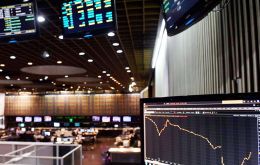
The Argentine Congress passed the government's capital markets reform bill on Wednesday, seeking to boost a troubled economy by reducing the power of market regulators and loosening restrictions on some funds investing in Argentina. Investors and economists consider the reform bill key to President Mauricio Macri's effort to boost investment in the country, whose capital markets are far smaller than regional peers.
-
Saturday, January 6th 2018 - 09:45 UTC
Argentine stock market reaches a new record, 13th session running of gains
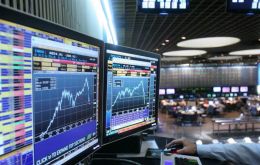
Good and not so good news from Argentina. Merval, the main index of the Buenos Aires Stock Exchange, rose 0.79% to 32,505.59 points on Friday, a new settlement record that marked the 13th consecutive session of gains to the Argentine stock market. Merval had a weekly gain of 7.11%.
-
Friday, December 29th 2017 - 09:38 UTC
Argentina's Merval breaks the 30.000-point barrier and ends 2017 gaining 77%
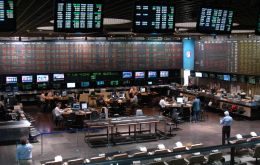
Merval, the benchmark stock market index in Argentina, ended Thursday's last trading session of 2017 above the 30,000-point barrier for the first time in history. The index rose 2.84% to 30,024.24 after the local government increased the inflation target for the next couple of years, but reinforced its commitment to lower fiscal deficits in the future.
-
Thursday, December 28th 2017 - 10:18 UTC
Argentina's stock market Merval has gained around 75% in the last twelve months

Merval, the benchmark stock market index in Argentina, rose 0.25% to 29,260.33 on Wednesday, reflecting investor optimism that the Senate would pass the 2018 budget and a tax reform. It was the seventh consecutive increase of the index.
-
Friday, December 22nd 2017 - 09:56 UTC
Argentina: Approval of reform bills triggers markets
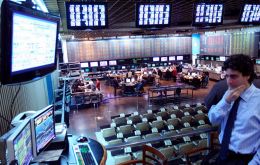
Merval, the main index of the Buenos Aires Stock Exchange, rose 1.51% Thursday, closing at 28,494.01 points - close to exceeding the maximum of the year, by 28,500 points. The Argentine stocks were driven by the approval of the pension and tax reforms passed this week in the House of Representatives.
-
Saturday, November 12th 2016 - 21:24 UTC
Trump wave keeps Merval on the fall for a total 9.25% drop in a week

The index of the leading shares of the Buenos Aires stock market returned to adjust results in 3.51% and accumulated thus four rounds of losses for a total drop of 9,25% sice Monday. The Merval started the week with 17,257.56 points and dropped Friday to 15,659.74 points, with significant decreases except for Tenaris, which managed to stay away from the trend of US-based businesses thanks to a positive balancesheet produced last week.
